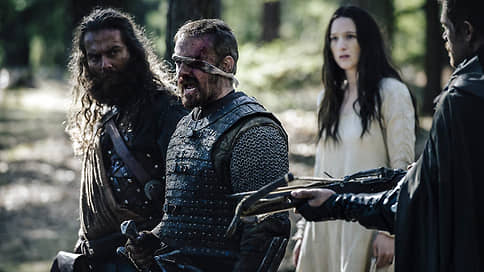Affected “Middle Ages” – Newspaper Kommersant No. 193 (7394) dated 10/18/2022
[ad_1]

The historical drama “The Middle Ages” by Petr Jakl is a kind of fan fiction based on the biography of the Czech national hero Jan Zizka. Julia Shagelman felt that the film would benefit if the authors hit the fantasy completely without restraint, making all the characters fictional and decorating the Bohemian landscapes with a couple of dragons.
The picture, which at home is simply called Jan Zizka, and was renamed at the international box office into a vague “Middle Ages” (the creators, apparently, do not expect the potential audience to get acquainted with the history of the Czech Republic, but the Middle Ages are now interesting to everyone), has become the most expensive Czech film in history. Its budget amounted to 500 million crowns (about $20 million) – a huge figure by the standards of European cinema in general, not to mention the countries of the former socialist camp. Although, looking at the uncrowded battle scenes and the only dress in which Princess Catherine (Sophie Lowe), the bride of a wealthy nobleman and the niece of the French king, spends the entire film, you begin to suspect that most of this amount went to the fees of Hollywood actors playing the main roles.
The declared scope is quite consistent with the gigantic figure of Jan Zizka (1360–1424), the legendary Hussite commander nicknamed the Terrible Blind Man (he lost both eyes in battles), a military reformer who turned detachments of poorly armed and untrained peasants into an invincible army. True, one can learn about his life from a textbook on the history of the southern and western Slavs for the third year of specialized universities, from an article on Wikipedia or, say, from the films of the “Hussite trilogy” by Czech director Otakar Vavra, filmed in 1954-1958, but not from the tape of Peter Yakl, which is more like a film adaptation of a computer game like The Witcher or a watery version of Game of Thrones, only without any mysticism and with characters that are difficult to remember, much less distinguish from each other.
“Middle Ages” is what is called an origin story, a summary of the events that (allegedly) made the hero who he is. Jan Zizka (Ben Foster) is a relatively young and fully sighted man in his prime, commanding a small band of mercenaries. The opening credits, coupled with a voice-over, hastily explain that chaos reigned in Europe after the death of the Holy Roman Emperor Charles IV, his heirs are fighting for power and even the Catholic Church has split in half, with one pope in Rome and the other in Avignon. Already by the way this introduction is succinctly presented, it becomes clear that the authors (there are six screenwriters here, including the director himself, but, obviously, not a single scientific consultant) are striving for historical persuasiveness in the first place. Be that as it may, Žižka and his men, somewhere in Italy, are rescuing a certain Pan Bores (Michael Caine, playing his role in the style of “wake up, but forgot to wake up”), their regular customer, from the attack of some other people.
Pan Boresh goes to Prague. What for? To travel from there to Rome. What for? To ask the Pope to declare the Czech king Wenceslas (Karel Roden), the son of the late Charles, emperor. His mission is complicated by two circumstances: firstly, Vatslav, like some kind of Viserys from the “Dragon House”, does not want to intrigue, fight, rule the empire, but wants to be left alone; secondly, there is no money for the trip. Boresh asks for them from the rich sir Rožmberk, by whom it is immediately clear that he is a bad person, because Til Schweiger plays him in a villainous mustache and goatee. Rožmberk does not want to fork out, and Boresh gives the task to Zizka and his comrades to kidnap Rožmberk’s bride Katerina so that the intractable feudal lord can be blackmailed by her.
This plan does not seem logical initially, and then Vaclav’s brother Siguzmund intervenes (Matthew Goode, painted in red, with undisguised pleasure, bringing the negativity of his hero to complete absurdity). He just wants to be the emperor, and at the same time to lure Rožmberk and his treasury to his side, so he sends his own thugs to steal the princess from Zizka. For the next hour and a half, the interested parties toss the unfortunate Katerina from hand to hand like a hot potato, and meanwhile she discovers with delightful amazement that, well, the suffering Middle Ages reigns around, in which men are impaled, women are raped, and teenagers are hanged in the trees, and a good deal of this is done at the behest of her fiancé.
Among these horrors, in theory, a romantic line should sprout between her and Zizka, but the stoic knight is clearly not up to it while the homeland is in danger, and when it finally almost comes to a kiss, the princess is once again intercepted by competitors. However, it is this unhappy love, according to the film, that becomes the last straw that turns Zizka into a fighter for the freedom of the Czech people. The ending, to be sure, is unexpected, but given both fictional and (especially) real circumstances, almost insulting.
[ad_2]
Source link






